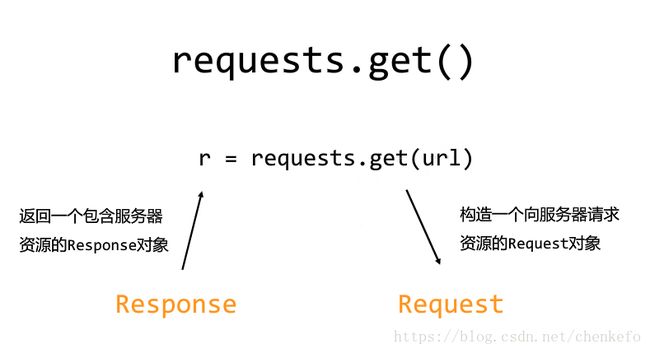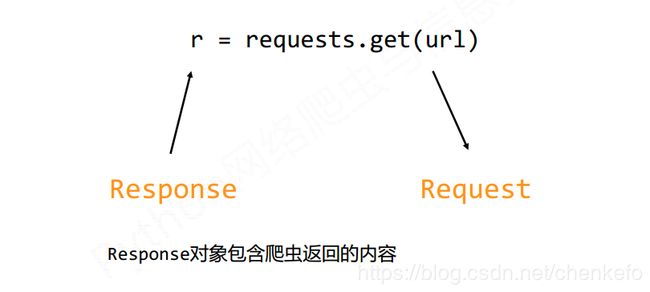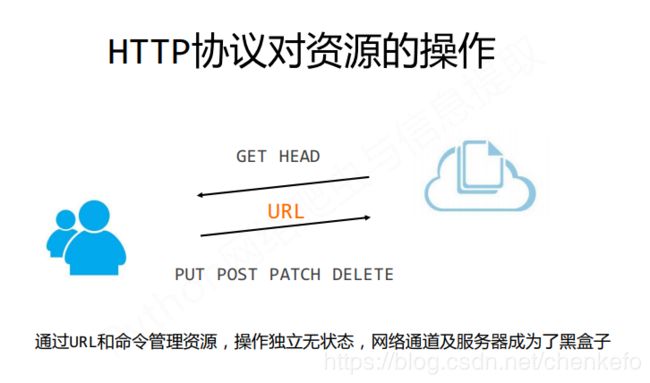Python网络爬虫与信息提取-第一章学习
一、Requests库的安装
win平台:‘以管理员身份运行‘ cmd ,执行 pip install requests
Ubuntu平台:sudo pip install requests
二、Requests库的安装小测试
import requests
r = requests.get("http://www.baidu.com")
print(r.status_code)
print(r.text)
运行结果:
200
三、Requests库的7个主要方法
| 方法 | 说明 |
|---|---|
| requests.request( ) | 构造一个请求,支撑以下各方法的基础方法 |
| requests.get( ) | 获取HTML网页的主要方法,对应于HTTP的GET |
| requests.head( ) | 获取HTML网页头信息的方法,对应于HTTP的HEAD |
| requests.post( ) | 向HTML网页提交POST请求的方法,对应于HTTP的POST |
| requests.put( ) | 向HTML网页提交PUT请求的方法,对应于HTTP的PUT |
| requests.patch( ) | 向HTML网页提交局部修改请求,对应于HTTP的PATCH |
| requests.delete( ) | 向HTML页面提交删除请求,对应于HTTP的DELETE |
四、Requests库的get( )方法
requests.get(url,params=None,**kwargs)
url : 拟获取页面的url链接
params : url中的额外参数,字典或字节流格式,可选
**kwargs : 12个控制访问的参数
五、Request库的2个重要对象
import requests
r = requests.get("http://www.baidu.com")
print(r.status_code)
print(type(r))
print(r.headers)
运行结果:
200
{‘Transfer-Encoding’: ‘chunked’, ‘Date’: ‘Thu, 25 Oct 2018 14:07:37 GMT’, ‘Server’: ‘bfe/1.0.8.18’, ‘Connection’: ‘Keep-Alive’, ‘Pragma’: ‘no-cache’, ‘Cache-Control’: ‘private, no-cache, no-store, proxy-revalidate, no-transform’, ‘Content-Type’: ‘text/html’, ‘Content-Encoding’: ‘gzip’, ‘Set-Cookie’: ‘BDORZ=27315; max-age=86400; domain=.baidu.com; path=/’, ‘Last-Modified’: ‘Mon, 23 Jan 2017 13:28:16 GMT’}
六、Response对象的属性
| 属性 | 说明 |
|---|---|
| r.status_code | HTTP请求的返回状态,200表示连接成功,404表示失败 |
| r.text | HTTP响应内容的字符串形式,即,url对应的页面内容 |
| r.encoding | 从HTTP header中猜测的响应内容编码方式 |
| r.apparent_encoding | 从内容中分析出的响应内容编码方式(备选编码方式) |
| r.content | HTTP响应内容的二进制形式 |
>>> import requests
>>> r = requests.get("http://www.baidu.com")
>>> r.status_code
200
>>> r.text
'ç\x99¾åº¦ä¸\x80ä¸\x8bï¼\x8cä½\xa0å°±ç\x9f¥é\x81\x93 '
>>> r.encoding
'ISO-8859-1'
>>> r.apparent_encoding
'utf-8'
>>> r.encoding = "utf-8"
>>> r.text
'<!DOCTYPE html><html><head><meta http-equiv="content-type" content="text/html;charset=utf-8"/><meta http-equiv="X-UA-Compatible" content="IE=Edge"/><meta content="never" name="referrer"/><title>百度一下,你就知道</title><style>html,body{height:100%}html{overflow-y:auto}body{font:12px arial;background:#fff}body,p,form,ul,li{margin:0;padding:0;list-style:none}body,form{position:relative}td{text-align:left}img{border:0}a{color:#00c}a:active{color:#f60}input{border:0;padding:0}#wrapper{position:relative;_position:;min-height:100%}#head{padding-bottom:100px;text-align:center;*z-index:1}#ftCon{height:100px;position:absolute;bottom:44px;text-align:center;width:100%;margin:0 auto;z-index:0;overflow:hidden}#ftConw{width:720px;margin:0 auto}#lh{margin:16px 0 5px;word-spacing:3px}#lh a{margin:0 10px}#cp,#cp a{color:#666}#wrapper{min-width:810px;height:100%;min-height:600px}#head{position:relative;padding-bottom:0;height:100%;min-height:600px}#head .head_wrapper{height:100%}#form{margin:22px auto 0;width:641px;text-align:left;z-index:100}#form .bdsug{top:35px}#kw{position:relative}.s_btn{width:95px;height:32px;padding-top:2px\\9;font-size:14px;background-color:#ddd;background-position:0 -48px;cursor:pointer}.s_btn{width:100px;height:36px;color:white;font-size:15px;letter-spacing:1px;background:#3385ff;border-bottom:1px solid #2d78f4;outline:medium;*border-bottom:0;-webkit-appearance:none;-webkit-border-radius:0}.s_btn.btnhover{background:#317ef3;border-bottom:1px solid #2868c8;*border-bottom:0;box-shadow:1px 1px 1px #ccc}.s_btn_wr{width:97px;height:34px;display:inline-block;background-position:-120px -48px;*position:relative;z-index:0;vertical-align:top}.s_btn_wr{width:auto;height:auto;border-bottom:1px solid transparent;*border-bottom:0}.s_ipt_wr{height:34px}.s_ipt_wr.bg,.s_btn_wr.bg,#su.bg{background-image:none}.s_ipt_wr{border:1px solid #b6b6b6;border-color:#7b7b7b #b6b6b6 #b6b6b6 #7b7b7b;background:#fff;display:inline-block;vertical-align:top;width:539px;margin-right:0;border-right-width:0;border-color:#b8b8b8 transparent #ccc #b8b8b8;overflow:hidden}.s_ipt{width:526px;height:22px;font:16px/18px arial;line-height:22px\\9;margin:6px 0 0 7px;padding:0;background:transparent;border:0;outline:0;-webkit-appearance:none}.bdsug{position:absolute;width:418px;background:#fff;display:none;border:1px solid #817f82}.bdsug li{width:511px;color:#000;font:14px arial;line-height:25px;padding:0 8px;position:relative;cursor:default}.bdsug{top:35px;width:538px;border-color:#ccc;box-shadow:1px 1px 3px #ededed;_overflow:hidden;-webkit-box-shadow:1px 1px 3px #ededed;-moz-box-shadow:1px 1px 3px #ededed;-o-box-shadow:1px 1px 3px #ededed}.s_form{position:relative;top:38.2%}.s_form_wrapper{position:relative;top:-191px}#u1{z-index:2;color:white;position:absolute;right:0;top:0;margin:19px 0 5px 0;padding:0 96px 0 0}#u1 a:link,#u1 a:visited{color:#666;text-decoration:none}#u1 a:hover,#u1 a:active{text-decoration:underline}#u1 a:active{color:#00c}#u1 a.bri,#u1 a.bri:visited{display:inline-block;position:absolute;right:10px;width:60px;height:23px;float:left;color:white;background:#38f;line-height:24px;font-size:13px;text-align:center;overflow:hidden;border-bottom:1px solid #38f;margin-left:19px;margin-right:2px}#u1 a.mnav,#u1 a.mnav:visited{float:left;color:#333;font-weight:bold;line-height:24px;margin-left:20px;font-size:13px;text-decoration:underline}
七、理解Response的编码
| r.encoding | 从HTTP header中猜测的响应内容编码方式 |
|---|---|
| r.apparent_encoding | 从内容中分析出的响应内容编码方式(备选编码方式) |
r.encoding:
如果header中不存在charset,则认为编码为ISO‐8859‐1
r.text根据r.encoding显示网页内容
r.apparent_encoding:
根据网页内容分析出的编码方式
可以看作是r.encoding的备选
八、理解Requests库的异常
| 异常 | 说明 |
|---|---|
| requests.ConnectionError | 网络连接错误异常,如DNS查询失败、拒绝连接等 |
| requests.HTTPError | HTTP错误异常 |
| requests.URLRequired | URL缺失异常 |
| requests.TooManyRedirects | 超过最大重定向次数,产生重定向异常 |
| requests.ConnectTimeout | 连接远程服务器超时异常 |
| requests.Timeout | 请求URL超时,产生超时异常 |
| r.raise_for_status() | 如果不是200,产生异常 requests.HTTPError |
注意:r.raise_for_status()在方法内部判断r.status_code是否等于200,不需要 增加额外的if语句,该语句便于利用try‐except进行异常处理
九、爬取网页的通用代码框架
import requests
def getHTMLText(url):
try:
r = requests.get(url, timeout=30)
r.raise_for_status() # 如果状态不是200,引发HTTPError异常
r.encoding = r.apparent_encoding
return r.text
except:
return "产生异常"
if __name__ == '__main__':
url = "https://weibo.com"
print(getHTMLText(url))
十、HTTP协议
HTTP:Hypertext Transfer Protocol,超文本传输协议
HTTP是一个基于“请求与响应”模式的、无状态的应用层协议
HTTP协议采用URL作为定位网络资源的标识,URL格式如下:
http://host[:port][path]
host : 合法的Internet主机域名或IP地址
port: 端口号,缺省端口为80
path: 请求资源的路径
HTTP URL实例:
http://www.bit.edu.cn
http://220.181.111.188/duty
HTTP URL的理解:
URL是通过HTTP协议存取资源的Internet路径,一个URL对应一个数据资源
HTTP协议对资源的操作:
| 方法 | 说明 |
|---|---|
| GET | 请求获取URL位置的资源 |
| HEAD | 请求获取URL位置资源的响应消息报告,即获得该资源的头部信息 |
| POST | 请求向URL位置的资源后附加新的数据 |
| PUT | 请求向URL位置存储一个资源,覆盖原URL位置的资源 |
| PATCH | 请求局部更新URL位置的资源,即改变该处资源的部分内容 |
| DELETE | 请求删除URL位置存储的资源 |
十一、理解PATCH和PUT的区别
假设URL位置有一组数据UserInfo,包括UserID、UserName等20个字段
需求:用户修改了UserName,其他不变
• 采用PATCH,仅向URL提交UserName的局部更新请求
• 采用PUT,必须将所有20个字段一并提交到URL,未提交字段被删除
PATCH的最主要好处:节省网络带宽
十二、HTTP协议与Request库
| HTTP协议方法 | Requests库方法 | 功能一致性 |
|---|---|---|
| GET | requests.get() | 一致 |
| HEAD | requests.head() | 一致 |
| POST | requests.post() | 一致 |
| PUT | requests.put() | 一致 |
| PATCH | requests.patch() | 一致 |
| DELETE | requests.delete() | 一致 |
Requests库的head()方法
>>> import requests
>>> r = requests.head("http://httpbin.org/get")
>>> r.headers
{'Date': 'Thu, 25 Oct 2018 15:37:52 GMT', 'Content-Length': '264', 'Access-Control-Allow-Origin': '*', 'Connection': 'keep-alive', 'Access-Control-Allow-Credentials': 'true', 'Via': '1.1 vegur', 'Server': 'gunicorn/19.9.0', 'Content-Type': 'application/json'}
>>> r.text
''
Requests库的post()方法
>>> payload = {'key1':'value1','key2':'value2'}
>>> r = requests.post('http://httpbin.org/post',data = payload)
>>> print(r.text)
{
"args": {},
"data": "",
"files": {},
"form": {
"key1": "value1",
"key2": "value2"
},
"headers": {
"Accept": "*/*",
"Accept-Encoding": "gzip, deflate",
"Connection": "close",
"Content-Length": "23",
"Content-Type": "application/x-www-form-urlencoded",
"Host": "httpbin.org",
"User-Agent": "python-requests/2.9.1"
},
"json": null,
"origin": "118.117.51.2",
"url": "http://httpbin.org/post"
}
结果:向URL POST一个字典,自动编码为form(表单)
Requests库的post()方法
>>> import requests
>>> r = requests.post('http://httpbin.org/post',data = 'ABC')
>>> print(r.text)
{
"args": {},
"data": "ABC",
"files": {},
"form": {},
"headers": {
"Accept": "*/*",
"Accept-Encoding": "gzip, deflate",
"Connection": "close",
"Content-Length": "3",
"Host": "httpbin.org",
"User-Agent": "python-requests/2.9.1"
},
"json": null,
"origin": "118.123.35.9",
"url": "http://httpbin.org/post"
}
结果:向URL POST一个字符串,自动编码为data
Requests库的put()方法
>>> import requests
>>> payload = {'key1':'value1','key2':'value2'}
>>> r = requests.put('http://httpbin.org/put',data = payload)
>>> print(r.text)
{
"args": {},
"data": "",
"files": {},
"form": {
"key1": "value1",
"key2": "value2"
},
"headers": {
"Accept": "*/*",
"Accept-Encoding": "gzip, deflate",
"Connection": "close",
"Content-Length": "23",
"Content-Type": "application/x-www-form-urlencoded",
"Host": "httpbin.org",
"User-Agent": "python-requests/2.9.1"
},
"json": null,
"origin": "118.123.35.9",
"url": "http://httpbin.org/put"
}
十三、Requests库主要方法解析
requests.request(method,url,**kwargs)
method : 请求方式,对应get/put/post等7种
url : 拟获取页面的url链接
**kwargs : 控制访问的参数,共13个
method:请求方式
r = requests.request(‘GET’,url,**kwargs)
r = requests.request(‘HEAD’,url,**kwargs)
r = requests.request(‘POST’,url,**kwargs)
r = requests.request(‘PUT’,url,**kwargs)
r = requests.request(‘PATCH’,url,**kwargs)
r = requests.request(‘delete’,url,**kwargs)
r = requests.request(‘OPTIONS’,url,**kwargs)
**kwargs:控制访问的参数,均为可选项
params:字典或字节序列,作为参数增加到url中
data:字典、字节序列或文件对象,作为Request的内容
json:JSON格式的数据,作为Request的内容
headers: 字典,HTTP定制头
cookies: 字典或CookieJar,Request中的cookie
auth: 元组,支持HTTP认证功能
files: 字典类型,传输文件
timeout: 设定超时时间,秒为单位
proxies: 字典类型,设定访问代理服务器,可以增加登录认证
allow_redirects: True/False,默认为True,重定向开关
stream: True/False,默认为True,获取内容立即下载开关
verify: True/False,默认为True,认证SSL证书开关
cert: 本地SSL证书路径
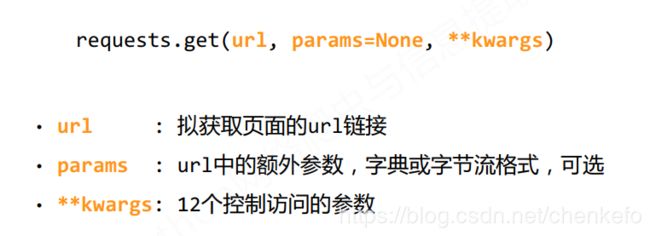

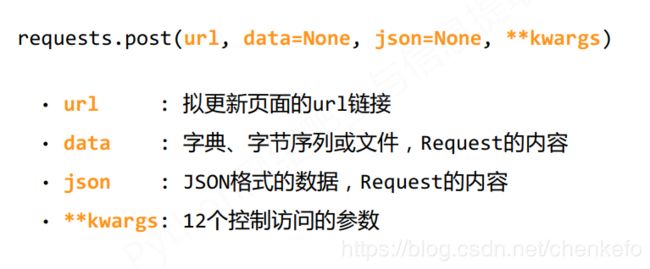
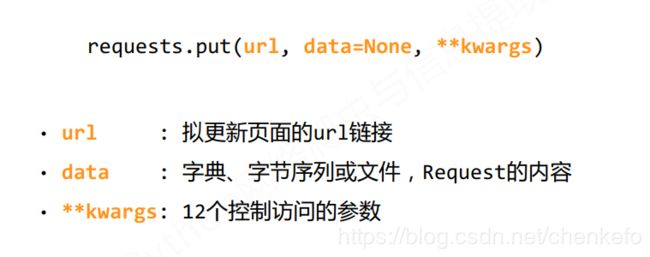

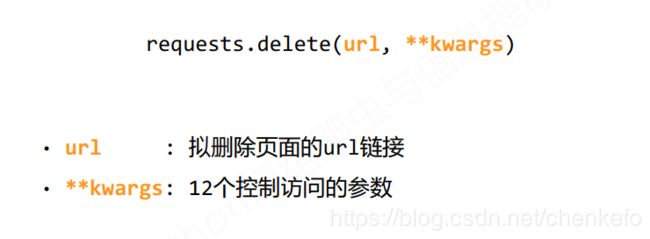
课程地址:Python网络爬虫与信息提取
